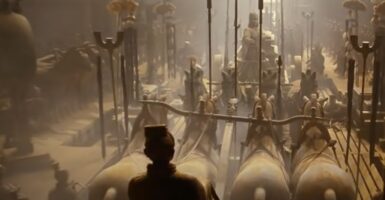Scientists Want To Replace The Presidential Election With A Lottery

Time is flying by as Americans get ready to vote in the country’s next presidential election in 2024. While everyone debates who will be the best candidate to run our country, there’s a new idea that scientists have brought to the table. Adam Grant, a psychologist at the University of Pennsylvania’s Wharton School, suggests using a lottery method to choose the next president, according to recent news from The Byte.
There is no perfect system for determining a president, which is why one psychologist believes a random lottery system is a better method.
The thought of choosing a new president via a lottery may have you conjuring up images of slot machines and big roulette wheels. The idea may sound similar to picking a name out of a hat, except that the winner gets the incredible power of running our country. But rest assured, Adam Grant and fellow psychologists have done their research, and the idea could actually make things much simpler and less dramatic than previous elections.
Rather than letting any person (like a rich businessman) enter the presidential lottery, they would need to pass a test to ensure they are qualified for the job. Similar to a civics test, the candidate would need to prove that they understand the public rights and duties of the United States. If they pass, then they would be added to the pool of other qualified candidates where a winner would be selected at random.

This concept is similar to a previous election strategy in ancient Greece, where democracy was first invented. In Athens, citizens would elect their government officials by selecting a random winner from a group of qualified candidates. It is also very similar to the jury duty selection method that is currently used in the United States.
If Americans were to elect a new president using the lottery method, then it could avoid a few issues that arise from the traditional election method.
A similar lottery-style election was utilized in Athens when a winner was randomly chosen from a pool of qualified candidates.
Firstly, if someone was elected president by a random lottery, then it would help to level the playing field. The winner would need to prove to citizens that they are in fact the right person for the job. They wouldn’t be able to just coast through their presidency because people liked them and voted for them, or they have the right letter next to their name.
Secondly, a lottery would help ensure that only qualified candidates are chosen in the presidential election. Right now, anyone can run for president if they are at least 35 years old, were born in America, and have lived in the country for at least 14 years. There is nothing in the Constitution that forbids a person from running for president if they can reach those basic requirements, but realistically, it’s limited to those with wealth.
The largest point in favor of a lottery instead of elections would be doing away with absurdly expensive presidential campaigns.
Lastly, a lottery election would mean that candidates would not have to worry about winning over voters. Ideally, this would put an end to expensive presidential campaigns, mudslinging and social media wars, and empty promises made by candidates who want your vote.












